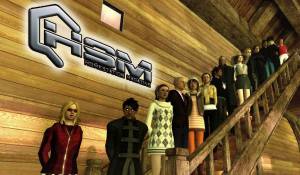Dénouement
Thou thy worldly task hast done,
Home art gone, and ta’en thy wages;
Golden lads and girls all must,
As chimney sweepers come to dust.
by NorseGamer, HSM Publisher
Sometimes you’d rather do anything other than write.
Watch a movie. Eat crackers. Go outside. Anything to put off having to write what you know you have to write, because in order to crack the spine of the emotions you’re trying to convey, you have to go through the process of feeling it. Which, at times, is about as pleasant as being stabbed in the head with a walrus.
Because the final, inexorable truth is this: HomeStation is now at its end.
This fanzine has been a part of my life for nearly four years. And it completely changed my life — for the better.
Funny thing is, it was all completely by accident. Home, to me, was nothing more than a fun respite from the stresses of the real world: the combination of an economic crash which devastated my industry and a divorce which devastated my household were huge issues to contend with, and the lure of virtual escapism was thus quite powerful. (Hence this publication’s contention that you have to be slightly damaged in some way to truly understand the appeal of a social MMO. It comes from personal experience.)
But what started as a hobby turned into a mission: to create a publication that would serve as the literary journal of one of the most unique experiments in the history of the games industry, and serve as the preeminent voice of reasoned, constructive feedback for the parties involved in its creation and sustention. We believe strongly in the aphorism that water seeks its own level; a brand associated with strong editorial standards, consistent product output and a lack of me-first ego trolls would, by its very nature, attract high-caliber writers, artists and filmmakers. And it did.
 Anyone taking part in a long and difficult endeavor, particularly if they’re really engaged in it, cannot help but look back upon the completed work and wistfully marvel. Think back to how different you were, for instance, as a teenager; how the four years of high school were a story unto themselves, and now seem like a different life altogether. Same goes for college. Same goes for your first job, your first relationship, your first big move to a new town, and so forth. I spent eleven years living in Hawaii, ten of those years working in resort development; now that I live in Los Angeles and work in game development on the Sony Pictures lot, those tropical days feel like they happened to someone else entirely.
Anyone taking part in a long and difficult endeavor, particularly if they’re really engaged in it, cannot help but look back upon the completed work and wistfully marvel. Think back to how different you were, for instance, as a teenager; how the four years of high school were a story unto themselves, and now seem like a different life altogether. Same goes for college. Same goes for your first job, your first relationship, your first big move to a new town, and so forth. I spent eleven years living in Hawaii, ten of those years working in resort development; now that I live in Los Angeles and work in game development on the Sony Pictures lot, those tropical days feel like they happened to someone else entirely.
What makes such stories fun, though, are the cast of characters. Some of my earliest friends in Home are long gone. Others have come with me. Still more have grown along different but roughly parallel tracks, leading to their own destinations. Along the way, some of the chairs became empty. New chairs, and new faces, introduced themselves. And now that we’re at the end of this journey, those of us who are left have to redefine our relationships with each other in a new, post-Home context.
These chapters are how we define our lives. If the average human male’s lifespan is 73.5 years, then I’ve spent roughly six percent of my life involved with this group of people as we forged ahead on this journey together.
There are a few authors whom HSM often quotes. One is Eric Hoffer. Another is Joe Straczynski. And it’s because these are people who influenced me, in much the same way that I hope my thoughts and words have occasionally resonated with you. So it is to the latter author that I turn for far more eloquent words about the end of HomeStation, when he wrote about the end of his great endeavor:
“So how do I think people will react?
I think a lot of people will cry.
But by the end of it, I think it will come around, and be all right…and mainly, that people will then look back at the whole story, through all these long years, and say, “It was a good story.” And close the cover, and put it on the shelf with the other books that will be reread again down the years, and turn off the lights, and go to bed feeling that the time was well spent.
Which is the most any writer can ever ask for. To tell a tale worth telling. To make people cry. To make people laugh. And even, once in a while, make them think about things, and see the world just a little differently than when they began.
 And then they can centerpunch me on the freeway, or throw a plane at me, and I won’t even mind. Because everything I set out to prove, I proved. Everything I set out to say, I said.
And then they can centerpunch me on the freeway, or throw a plane at me, and I won’t even mind. Because everything I set out to prove, I proved. Everything I set out to say, I said.
I’ve carried this story like a hermit crab carries its shell for five long years, counting the pilot. It’s been an *awfully* long and difficult road, and no one will ever really know just how hard this show was to make. Nor should they, because it isn’t the difficulty that makes the story, the *story* makes the story. But one way or another, aired as 522 or 422, when it airs the burden is off at last. Then it no longer belongs to me. It belongs to you. As should be.
And, in the end, I think you’ll be pleased.”
One question that’s come up, repeatedly, is why HomeStation isn’t riding out the end of Home. Why pull up stakes and move on now? Why not be there to chronicle Home’s final, florid days?
There are a few reasons for this.
The primary reason is that we’ve achieved everything we set out to achieve. Our purpose was to help, as a key voice from the community at large, shape Home’s evolution. That evolution has reached its terminus. At the same time, with our own LOOT EOD channel and regular appearances in the SCEE News Reader thanks to HPG, we achieved a larger in-Home audience penetration than anyone else out there. And multiple team members are now game developers themselves. If Home had a platinum trophy, HomeStation would proudly own it. We’re going out on our own terms, with everything accomplished.
The second reason is that we’ve frankly outgrown Home. Home’s original concept — a 3D social networking service for PlayStation gamers, which would serve as the core of the console experience (hence the name) — was absolutely brilliant. And, to be fair, given how truncated it ultimately turned out to be, it had one hell of a good run, which is largely due to the many talented people who worked on the platform. But the games industry — like the overall entertainment industry at large, which games are but one part of — has evolved and grown dramatically since Home’s original concept was penned two console generations ago, and Home’s limitations are blatantly conspicuous at this point. Just as Ultima Online — the first great MMO experience, which practically wrote the book on the genre — would seem a bit dated by today’s standards, so too must Home compete against the same relentless march of time. Eventually, you have to move on. Home may have been a place where damaged people went to heal, but at some point you have to see yourself as healed and get on with things.
 The third reason is that Home’s final phase, for those of you who choose to stick around for it, is something we feel should be experienced in the moment, and live on only in memory. While it’s tempting to chronicle the final days and dissolution of Home, à la Jan Rodricks broadcasting the final moments of Earth as its last human being in Clarke’s Childhood’s End, the reality is that the end of Home is such an intensely personal experience that no account of it could properly do it justice. It’s something that should be shared by those who choose to be there, in that moment. Perhaps some of us will choose to be there too, during the last days, just to see the old girl off — but it will be solely as Home citizens ourselves, our roles as this world’s chroniclers and commentators concluded.
The third reason is that Home’s final phase, for those of you who choose to stick around for it, is something we feel should be experienced in the moment, and live on only in memory. While it’s tempting to chronicle the final days and dissolution of Home, à la Jan Rodricks broadcasting the final moments of Earth as its last human being in Clarke’s Childhood’s End, the reality is that the end of Home is such an intensely personal experience that no account of it could properly do it justice. It’s something that should be shared by those who choose to be there, in that moment. Perhaps some of us will choose to be there too, during the last days, just to see the old girl off — but it will be solely as Home citizens ourselves, our roles as this world’s chroniclers and commentators concluded.
HomeStation’s audience measures in the hundreds of thousands. That number climbs if we include our in-Home viewership as well. And to you — all of you:
Thank you.
It has been our distinct privilege to serve you, and the entire Home community at large, both user and developer alike, for nearly half a decade. We hope that you will follow this writing team over to our new home at LOOT’s Community Media section — https://lootentertainment.com/media/ — where we will continue to entertain and enlighten across a vastly expanded canvas of topics.
For those of you whom we leave behind at this juncture:
This will be the penultimate HSM story published, and chronologically the last one ever written (the final HomeStation article, coming up next, was written over a year ago — because you never start a story unless you already have the ending in mind). If you choose to stay in Home for the remainder of its days, we can only hope we’ve helped brighten that experience for you over the years. And when Home finally does end in a few months, look back on that era with fondness while you move forward with your life.
For us, this is the end of the line. As I write this, the light is retreating up the slopes of the Santa Monica mountains; the battery on the laptop is low, and the sun is setting, out beyond the horizon of the Pacific.
But every sunset brings with it the promise of the next sunrise, and the renewal a new day brings. Embrace it.
Share
| Tweet |



 LinkedIn
LinkedIn Twitter
Twitter
:^/ Feeling pretty wistful about it all, myself. Woke up for a drink of water, decided to check online, and found this. Currently too fuzzy-headed to was eloquent, so I’ll just cut to the chase:
;^) Congratulations on five years as the most professionally run fan site I’ve ever encountered. And I’ve seen a few.
Looking forward….
:^/ Ahem. *wax eloquent. Dang, you guys need an edit button.
Jason, first and foremost… Great Job on this piece. I’ve always admired your writing. kudos!
For a little over a year, some Home users have talked about the end of PlayStation Home. The exclusion of any mention at 2013’s E3 was a good sign.
16 months later… looking at saying good bye to a dear friend that has been there for me for about 6 years.
…. Playstation Home.
Jason, I was also in the Resort business (for 12 years) *background music plays ‘It’s a Small World’*
Great article, great insight, great memories.